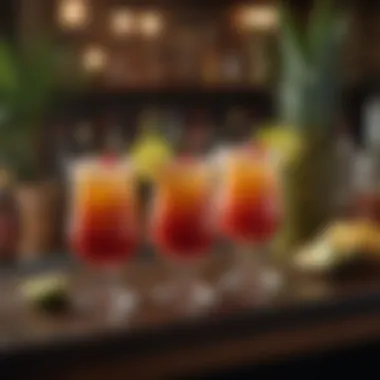Discover the Unique Floating Tiki Bar in Fort Lauderdale


Intro
The floating tiki bar experience in Fort Lauderdale represents a distinctive fusion of leisure and culinary adventure. These establishments are not merely bars; they serve as vibrant social hubs where guests congregate to unwind while enjoying panoramic views of the waterways. The allure of sipping a tropical cocktail amidst lush surroundings becomes an integral part of the Fort Lauderdale culture.
This article will explore the design aesthetics that capture the natural beauty of the area, the carefully curated food and drink menus, and the social dynamics that arise within these floating retreats. Furthermore, we will discuss the implications for tourism and how the tiki bars exemplify the local culinary scene, enhancing the experience of both locals and visitors alike. By analyzing these elements, readers can gain insights into the significance of these establishments in the broader canvas of Fort Lauderdale's vibrant lifestyle.
Prelude to Floating Tiki Bars
Floating tiki bars represent more than just a place to sip cocktails; they embody a lifestyle choice and an experience unique to coastal culture. In this bustling tourism hub of Fort Lauderdale, these venues fuse leisure, culinary innovation, and social interaction. They draw both locals and tourists who seek an engaging atmosphere with a distinct nautical twist. This section serves as an essential introduction to these vibrant establishments, highlighting their significance in shaping the local dining landscape and tourism strategy.
Definition and Concept
Floating tiki bars are essentially bars that operate on boats or barges, providing patrons with a dynamic experience set against a scenic watery backdrop. The concept is a blend of central bar seating, often outfitted with thatched roofs, tropical decorations, and a menu full of exotic concoctions. Visitors have the opportunity to enjoy sunbathing, socializing, and savoring drinks while gently cruising the waterways. This creates a unique leisure experience that is hard to replicate on land. The charm lies in the dual advantage of fresh air and picturesque views while engaging in a social and culinary adventure. Each floating tiki bar can differ in vibe, but they all focus on relaxation and fun.
History of Tiki Bar Culture
The roots of tiki bar culture trace back to the mid-20th century, finding significance during the post-World War II period. With increasing accessibility to Polynesian culture, tiki bars began to emerge as havens for escapism and exoticism. While the mainland’s tiki bars were predominantly land-based, the floating versions have gained popularity in coastal areas like Fort Lauderdale. The region's historical connection with maritime activities and tourism has made it an ideal location for this evolution. As travelers sought more immersive experiences in vacation hotspots, floating tiki bars offered a blend of drinking and boating, appealing to both nostalgia and modern preferences. Their rise aligns with broader consumer trends favoring unique, experience-driven tourism, positioning them as a staple in Fort Lauderdale's recreational scene.
"The floating tiki bar phenomenon revitalizes the traditional cocktail experience by embracing the surrounding environment."
The combination of vibrant tropical themes, local seafood offerings, and craft cocktails further defines these establishments. They not only serve drinks but integrate local influences, which enhances the culinary aspect of the experience. Thus, understanding the genesis and evolution of tiki bars is crucial for appreciating their role in contemporary Fort Lauderdale culture and tourism.
Fort Lauderdale as a Floating Tiki Bar Destination
Fort Lauderdale stands as a premier location for floating tiki bars, combining its natural beauty with a vibrant social scene. The floating tiki bar experience here is attractive for many reasons. First, the city is home to a vast array of waterways that encourage leisure activities. This scenic setting offers an escape from the more traditional dining experiences found on land. The ability to enjoy a drink while surrounded by water creates a distinct atmosphere that enhances the overall enjoyment of the experience.
Additionally, the establishment of floating tiki bars caters to both locals and tourists. As a focal point in Florida's recreational landscape, the city's tiki bars have become a must-see for anyone visiting. Not only do these establishments allow for unique culinary exploration, but they also provide a platform for social interactions among diverse groups of people.
Moreover, floating tiki bars contribute significantly to Fort Lauderdale's image as a tourist hotspot. People seek out these experiences more than standard bars or restaurants. The novelty of sipping cocktails on the water while enjoying a laid-back setting is appealing to many. The increasing popularity of these bars highlights their importance to the local economy and cultural landscape.
Geographical Advantages
Fort Lauderdale's geographical layout is one of the key elements that makes it an ideal destination for floating tiki bars. The city is situated along the Atlantic coast and has over 300 miles of navigable waterways. This extensive network of canals and rivers presents numerous opportunities for unique dining experiences on the water.
The mild climate throughout the year further enhances the appeal of floating tiki bars. With an abundance of sunny days, patrons can easily enjoy their time outdoors, basking in the sun while sipping drinks. The setting invites relaxation and leisure, which is at the heart of the tiki bar experience.
In addition to the natural beauty, proximity to other attractions plays a role in drawing customers. Close to pristine beaches, shopping centers, and cultural sites, floating tiki bars provide an effortless integration into the local tourism scene. Visitors can enjoy a well-rounded experience by combining a visit to a tiki bar with other leisure activities in the area.
Tourism Trends in Fort Lauderdale
The floating tiki bar phenomenon correlates directly with the trends observed in Fort Lauderdale's tourism. More and more visitors are seeking experiences that go beyond passive sightseeing. Floating tiki bars fulfill this desire for active engagement and immersive dining experiences.
This shift in preference is evident as tourists increasingly participate in water-based activities. Boat tours, water sports, and now floating bars have become a staple in the local tourism offerings. As travelers look for memorable experiences, floating tiki bars provide an environment that fosters interaction and enjoyment.
Furthermore, the culinary diversity offered by these bars reflects broader tourism trends. Tourists seek unique, local flavors, and many floating tiki bars feature menus that highlight regional ingredients and flavor profiles. People are more inclined to seek out gastronomic experiences that resonate with local culture.


Overall, Fort Lauderdale's positioning as a floating tiki bar destination underscores the dynamic nature of culinary tourism. The integration of leisure, local flavors, and social interaction creates an appealing atmosphere for visitors of all types.
Design and Ambiance of Floating Tiki Bars
The design and ambiance of floating tiki bars is essential to their allure. In Fort Lauderdale, these establishments predominate as vibrant hubs of social interaction and culinary exploration. The design elements create an inviting atmosphere that enhances the overall experience. Patrons are not just consuming food and drinks; they are also embracing an experience that is visually appealing and contextually enriched. The aesthetics of a floating tiki bar play a crucial role in attracting a diverse crowd, providing a memorable outing.
Architectural Considerations
The architectural elements of floating tiki bars derive from various influences, often blending traditional island styles with modern designs. Many bars feature thatched roofs, bamboo accents, and open-air layouts. These components are critical as they establish a cozy and tropical feel, synonymous with the tiki culture. Additionally, they must adhere to strict safety measures and stability requirements since these bars operate on water.
- Structural Integrity: Ensuring that the structure can withstand the elements is paramount. Engineers consider the effect of wind, waves, and water levels when developing designs.
- Mobility: Some tiki bars are designed to be mobile, maneuvering through Fort Lauderdale’s waterways. This mobility invites another layer of creativity, as they have to maintain both aesthetic appeal and function when on the move.
The integration of these architectural considerations results in a structure that is not only beautiful but also functional and safe for patrons.
Interior Design Elements
Inside the floating tiki bar, the design continues to intrigue. Colors are often vibrant—hues of turquoise, orange, and yellow dominate, reflecting the surrounding marine landscape. Seating is typically casual, with options like high-top tables and lounge sections made from sustainable materials. Here are some elements that contribute to the ambiance:
- Lighting: Ambient lighting features prominently, especially during evening hours. Soft lighting can create an intimate feel, making it perfect for both gathering with friends and quiet evening dinners.
- Decorative Artifacts: Many bars adorn their walls with island-inspired paraphernalia and local artwork. These items offer customers a taste of the region's culture while enhancing the tiki vibe.
This focus on interior design not only creates comfort but also promotes longevity, as patrons are more likely to return when they feel relaxed in a well-designed space.
Outdoor vs. Indoor Experience
Floating tiki bars present distinct experiences depending on whether patrons choose indoors or outdoors. Each offers a unique perspective on dining and socializing on the water.
- Outdoor Experience: Being outside, patrons can enjoy the fresh air and scenic views of Fort Lauderdale’s waterways. Sunsets provide a captivating backdrop, enhancing the overall meal. The outdoor area is typically furnished with lounge seating, umbrellas, and sometimes live music, which enriches the atmosphere.
- Indoor Experience: On the other hand, the indoor space offers a respite from the heat and is often climate-controlled. This setting allows for a cozy dining experience, especially during hotter months or when rain may intervene.
Culinary Offerings at Floating Tiki Bars
Culinary offerings at floating tiki bars play a crucial role in the overall experience. They create a unique atmosphere that combines the beauty of the water with delicious food and drink. The offerings reflect the region's culture and appeal to the diverse clientele frequenting these establishments. The blend of local ingredients and signature drinks hand-crafted by talented mixologists enhances the enjoyment of being on the water. Here, we explore three important aspects of culinary offerings: signature drinks and cocktails, food menus, and sourcing local ingredients.
Signature Drinks and Cocktails
Signature drinks and cocktails are critical in setting the tone for the floating tiki bar experience. These libations often celebrate tropical flavors and exotic ingredients, drawing inspiration from the island vibes that tiki bars are known for. Common ingredients include rum, tropical fruits like coconut, pineapple, and lime. Variations on popular cocktails, such as the Mai Tai or Pina Colada, provide guests with refreshing options.
The design and presentation of these drinks contribute to the overall aesthetic. Glassware, garnishes, and ice sculptures add flair that enhances the drinking experience. Using fresh ingredients and innovative techniques, mixologists often create drinks that not only taste great but also look visually appealing. This attention to detail is vital in capturing the essence of the tiki bar culture.
Food Menus that Complement the Experience
Food menus at floating tiki bars typically aim to complement the vibrant drinking experience. The dishes served must align with the overall theme of the bars. This often includes a variety of appetizers, entrees, and desserts that embody a tropical flair and exotic ingredients. Common dishes found include coconut shrimp, jerk chicken, and island-style fish tacos.
Menus often emphasize sharing, making it easy for groups to sample a few dishes together. This approach encourages socialization among patrons while enjoying their meals. Each dish is crafted with care, aiming to create memorable flavors that keep guests coming back for more. Furthermore, having vegetarian and gluten-free options ensures inclusivity among diverse dietary needs, inviting a broader audience to partake in the experience.
Sourcing Local Ingredients


Sourcing local ingredients is essential for floating tiki bars. This practice speaks to the commitment to quality and sustainability, and it also promotes regional agriculture. Most bars engage with local farmers and producers to ensure freshness. Seasonal ingredients enhance flavor profiles and contribute to a unique dining experience.
In addition to enhancing taste, using local ingredients supports the community and reduces the carbon footprint associated with transportation. By focusing on local sourcing, tiki bars can tell a story through their dishes and drinks, connecting patrons to the flavors of Fort Lauderdale.
Local ingredients enrich culinary experiences while supporting community sustainability.
In summary, the culinary offerings at floating tiki bars elevate the entire experience, making it not just about drinking, but about exploring flavors that are reflective of the surrounding environment. With signature drinks, thoughtful menus, and an emphasis on local sourcing, these establishments continue to draw food lovers of all ages.
Social Dynamics of the Tiki Bar Environment
The social dynamics of floating tiki bars play a critical role in shaping the overall experience for patrons. These establishments serve as more than just venues for eating and drinking; they are spaces for connection, conversation, and community. Here, the factors such as atmosphere, customer interactions, and event programming come together to form a unique social environment that appeals to a diverse range of visitors.
Cultural Interactions
Floating tiki bars often attract a variegated clientele, including locals and tourists, each bringing their own cultural backgrounds and experiences. These interactions create vibrant dialogues and exchanges that enrich the bar's atmosphere. The blend of ideas, stories, and traditions fosters an inclusive space that encourages cross-cultural appreciation.
Moreover, the decor and themes found within these bars often reflect local culture and history, serving as a conversation starter. For instance, patrons may discover artifacts or artwork that give insight into Fort Lauderdale’s heritage, piquing their curiosity and promoting dialogue between different groups. The exposure to varied perspectives enhances the sense of community, transforming the drinking experience into an exploration of cultural identity.
Community Engagement and Events
Community involvement is a vital aspect of the floating tiki bar scene. Many establishments host events that strengthen social ties and foster a sense of belonging. Regular events like live music nights, themed parties, or charity fundraisers attract a loyal following and draw in new guests.
The role of social media is also significant in promoting these events, enabling easy sharing and engagement. Patrons often leave reviews or post about their experiences on platforms such as Facebook and Reddit, enhancing the bar's reputation within the community and beyond.
"Floating tiki bars are not just places to drink; they become hubs for interaction and cultural exchanges among diverse groups."
Additionally, these establishments may collaborate with local artists and businesses, offering a platform for them to showcase their talents. Participation in neighborhood events or festivals further cements their status as community cornerstones, contributing to local culture and tourism.
Thus, the social dynamics at floating tiki bars not only create individual memorable experiences but also underline the importance of community and cultural engagement in Fort Lauderdale. By understanding these dynamics, patrons can appreciate the deeper connections formed over shared meals and drinks, making every visit more than just a simple outing.
Safety and Regulations
The significance of safety and regulations cannot be understated in the context of floating tiki bars. These establishments operate in a unique environment, blending culinary experiences with the dynamics of watercraft. Therefore, ensuring the safety of patrons and compliance with legal standards is essential. Consumers are often drawn to floating tiki bars for their novelty and relaxed atmosphere, but this should not come at the expense of safety.
Key elements to consider include health and safety standards, as well as licensing and operational regulations. Compliance with these requirements serves to protect both consumers and operators, fostering trust and encouraging repeat visits. As the trend for floating tiki bars grows, understanding these safety measures becomes crucial for the sustainability of the business model and the overall well-being of guests.
Health and Safety Standards
Health and safety standards are vital in ensuring a secure and enjoyable floating tiki bar experience. These standards cover a wide range of considerations, such as food safety, hygiene, and the safety of the watercraft itself. The following are key aspects:
- Food Preparation: All food must be prepared and stored in compliance with local health codes. This involves maintaining proper temperature controls and employing safe handling practices to prevent contamination.
- Hygiene Practices: Operators must prioritize hygiene, including regular cleaning of surfaces and sanitation of utensils. It's vital to keep restrooms clean and well-stocked to ensure the comfort of guests.
- Emergency Procedures: Proper training for staff on emergency response protocols, including first aid and evacuation procedures, is essential. Also, the availability of life jackets and a reliable means of communication is required.
Adhering to health and safety standards not only protects patrons but also enhances the reputation of the tiki bar. Happy and safe customers are more likely to return and recommend the experience to others.
Licensing and Operational Regulations


Licensing and operational regulations are imperative for the legal operation of floating tiki bars. These regulations differ by locality, but generally encompass several critical areas:
- Alcohol Licensing: Floating tiki bars must procure appropriate licenses to serve alcohol. This often includes obtaining a state liquor license and following specific local guidelines.
- Operational Permits: Businesses must obtain the required permits for operating on water. This can involve inspections and compliance with environmental considerations specific to waterways.
- Insurance Requirements: Liability insurance is often mandatory to protect against potential claims arising from accidents or incidents onboard.
Navigating through the often complex licensing landscape is crucial for operators. Failure to comply with these regulatory standards can result in significant legal repercussions, including fines or closure of the establishment.
"Maintaining high standards for safety and regulation is not just about compliance; it’s about cultivating a trustworthy environment for enjoyment."
Future Trends in Floating Tiki Bars
The floating tiki bar experience reflects both cultural appreciation and evolving consumer interests. Understanding the future trends of floating tiki bars is crucial in recognizing how they may adapt to changing societal expectations, market dynamics, and environmental considerations. This section delves into three main areas: innovative concepts and designs, sustainability practices, and potential for expansion. Each aspect plays a significant role in shaping the future of these establishments and their relevance to the overall Fort Lauderdale culinary landscape.
Innovative Concepts and Designs
The design of floating tiki bars is constantly evolving. Modern patrons seek unique experience that sets these venues apart from traditional bars.
- Theming and Aesthetics: Innovative designs now incorporate a variety of themes that cater to different tastes—from luxurious Polynesian vibes to modern minimalist aesthetics. Bars may feature open-air layouts or incorporate smart technology for enhanced guest interaction.
- Modularity and Customization: Many operators are moving towards modular designs that allow for adaptability based on the number of guests and the specific occasion. This flexibility ensures that patrons have a tailored experience while maximizing the use of space.
- Inclusivity Elements: New concepts may focus on inclusivity, with designs that accommodate all age groups and those with different needs. This ensures that the tiki bar culture is accessible and welcoming to everyone, fostering a diverse social environment.
"Floating tiki bars signify a blend of leisure, culinary diversity, and social interaction, making them a vibrant part of Fort Lauderdale’s scene."
Sustainability Practices
Sustainability is becoming vital for the floating tiki bar niche as awareness of environmental issues rises. Different practices are emerging to mitigate the ecological footprint of these establishments.
- Sustainable Sourcing: Many tiki bars are prioritizing locally sourced ingredients. This not only supports local farmers and producers but also reduces transportation emissions.
- Eco-friendly Materials: Operators are increasingly using sustainable materials for construction and furniture, including reclaimed wood and recycled materials. This aligns with the green movement prevalent among today's consumers.
- Waste Management: Innovative waste management systems, such as composting organic waste or implementing a no-plastic policy, are a growing trend. This commitment to sustainability can enhance a bar's brand and appeal.
Potential for Expansion
The potential for expansion in the floating tiki bar market is significant. As Fort Lauderdale becomes a more appealing locale for both locals and tourists, there are several areas to consider.
- Geographic Diversification: Expanding into new waterways and areas can attract diverse customer bases. Bars may consider setting up in areas less frequented by tourists to tap into local dining trends as well.
- Franchising Models: Successful tiki bars may consider franchising their concept, allowing other entrepreneurs to create similar experiences in different locations. This could lead to the establishment of a recognizable brand within the floating bar scene.
- Event Hosting: Creating unique events, such as themed parties or cultural celebrations, can provide additional revenue streams while fostering community engagement. Collaborating with local artists or musicians could enhance the appeal.
Ending and Reflections
The conclusion and reflections section is essential in encapsulating the vibrant and multifaceted experience of floating tiki bars in Fort Lauderdale. As this article has explored, the allure of these establishments lies not just in their unique location but also in the layered experience they offer to patrons. By diving deeper into this capstone, we can capture what the floating tiki bar represents in terms of leisure, community, and culinary creativity.
Recap of the Floating Tiki Bar Experience
The floating tiki bar experience combines relaxation with indulgence. Visitors often find themselves on a tranquil body of water, surrounded by palm trees and tropical ambiance. The design elements, from the bamboo structure to the bright decor, enhance the tropical vibe. Patrons can enjoy signature cocktails, expertly crafted from local ingredients, while sampling food that complements the region's flavors. The unity of the culinary offerings and the stunning setting create an immersive experience that heightens sensory pleasure. Many who visit floating tiki bars often remember it as a highlight of their Florida trip, fostering a sense of nostalgia and affinity for these unique locales.
"Leisure and culinary exploration converge seamlessly in Fort Lauderdale's floating tiki bars."
Engagement with staff and fellow patrons fosters community, transforming the dining experience into something more communal. It is not just about individual enjoyment; it is about sharing moments and connecting with others. This social dynamic accentuates the overall experience, making each visit memorable.
Implications for Future Culinary Trends
As floating tiki bars thrive, they also indicate evolving trends in the culinary landscape. They reflect a shift towards outdoor dining and the incorporation of local flavors. The emphasis on sourcing fresh, local ingredients resonates with a growing audience concerned about sustainability and quality. Their popularity highlights the importance of experiential dining, where environment and atmosphere enhance food enjoyment.
The floating tiki bar concept may inspire similar ventures in other coastal areas, suggesting a potential wave of new establishments that merge local culture with innovative dining experiences. Culinary trends could lean more towards fusion and collaboration, offering diverse menus that celebrate the region's agricultural bounty. This not only enriches the local culinary scene but also encourages farmers and producers to engage with these businesses directly, fostering a more sustainable and interconnected food system.
In summary, the floating tiki bar experience is a microcosm of broader trends in tourism, culinary exploration, and community engagement. Its significance will likely continue to evolve, reflecting societal changes and consumer preferences that prioritize unique, quality experiences.







